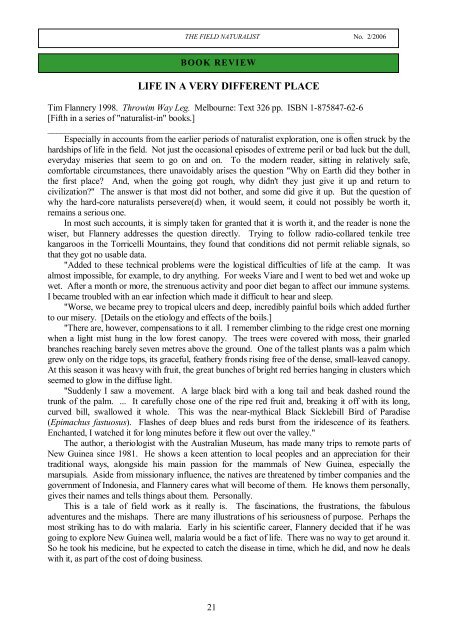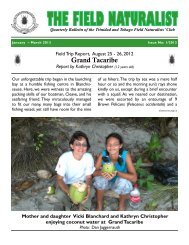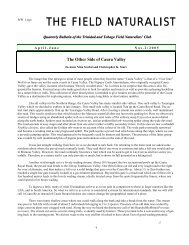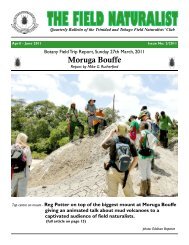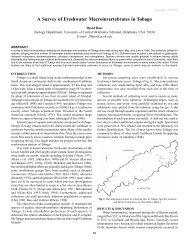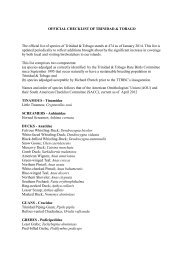Vol 2 - The Trinidad and Tobago Field Naturalists' Club
Vol 2 - The Trinidad and Tobago Field Naturalists' Club
Vol 2 - The Trinidad and Tobago Field Naturalists' Club
You also want an ePaper? Increase the reach of your titles
YUMPU automatically turns print PDFs into web optimized ePapers that Google loves.
THE FIELD NATURALIST No. 2/2006BOOK REVIEWLIFE IN A VERY DIFFERENT PLACETim Flannery 1998. Throwim Way Leg. Melbourne: Text 326 pp. ISBN 1-875847-62-6[Fifth in a series of "naturalist-in" books.]_____________________________________________________________________Especially in accounts from the earlier periods of naturalist exploration, one is often struck by thehardships of life in the field. Not just the occasional episodes of extreme peril or bad luck but the dull,everyday miseries that seem to go on <strong>and</strong> on. To the modern reader, sitting in relatively safe,comfortable circumstances, there unavoidably arises the question "Why on Earth did they bother inthe first place? And, when the going got rough, why didn't they just give it up <strong>and</strong> return tocivilization?" <strong>The</strong> answer is that most did not bother, <strong>and</strong> some did give it up. But the question ofwhy the hard-core naturalists persevere(d) when, it would seem, it could not possibly be worth it,remains a serious one.In most such accounts, it is simply taken for granted that it is worth it, <strong>and</strong> the reader is none thewiser, but Flannery addresses the question directly. Trying to follow radio-collared tenkile treekangaroos in the Torricelli Mountains, they found that conditions did not permit reliable signals, sothat they got no usable data."Added to these technical problems were the logistical difficulties of life at the camp. It wasalmost impossible, for example, to dry anything. For weeks Viare <strong>and</strong> I went to bed wet <strong>and</strong> woke upwet. After a month or more, the strenuous activity <strong>and</strong> poor diet began to affect our immune systems.I became troubled with an ear infection which made it difficult to hear <strong>and</strong> sleep."Worse, we became prey to tropical ulcers <strong>and</strong> deep, incredibly painful boils which added furtherto our misery. [Details on the etiology <strong>and</strong> effects of the boils.]"<strong>The</strong>re are, however, compensations to it all. I remember climbing to the ridge crest one morningwhen a light mist hung in the low forest canopy. <strong>The</strong> trees were covered with moss, their gnarledbranches reaching barely seven metres above the ground. One of the tallest plants was a palm whichgrew only on the ridge tops, its graceful, feathery fronds rising free of the dense, small-leaved canopy.At this season it was heavy with fruit, the great bunches of bright red berries hanging in clusters whichseemed to glow in the diffuse light."Suddenly I saw a movement. A large black bird with a long tail <strong>and</strong> beak dashed round thetrunk of the palm. ... It carefully chose one of the ripe red fruit <strong>and</strong>, breaking it off with its long,curved bill, swallowed it whole. This was the near-mythical Black Sicklebill Bird of Paradise(Epimachus fastuosus). Flashes of deep blues <strong>and</strong> reds burst from the iridescence of its feathers.Enchanted, I watched it for long minutes before it flew out over the valley."<strong>The</strong> author, a theriologist with the Australian Museum, has made many trips to remote parts ofNew Guinea since 1981. He shows a keen attention to local peoples <strong>and</strong> an appreciation for theirtraditional ways, alongside his main passion for the mammals of New Guinea, especially themarsupials. Aside from missionary influence, the natives are threatened by timber companies <strong>and</strong> thegovernment of Indonesia, <strong>and</strong> Flannery cares what will become of them. He knows them personally,gives their names <strong>and</strong> tells things about them. Personally.This is a tale of field work as it really is. <strong>The</strong> fascinations, the frustrations, the fabulousadventures <strong>and</strong> the mishaps. <strong>The</strong>re are many illustrations of his seriousness of purpose. Perhaps themost striking has to do with malaria. Early in his scientific career, Flannery decided that if he wasgoing to explore New Guinea well, malaria would be a fact of life. <strong>The</strong>re was no way to get around it.So he took his medicine, but he expected to catch the disease in time, which he did, <strong>and</strong> now he dealswith it, as part of the cost of doing business.21


